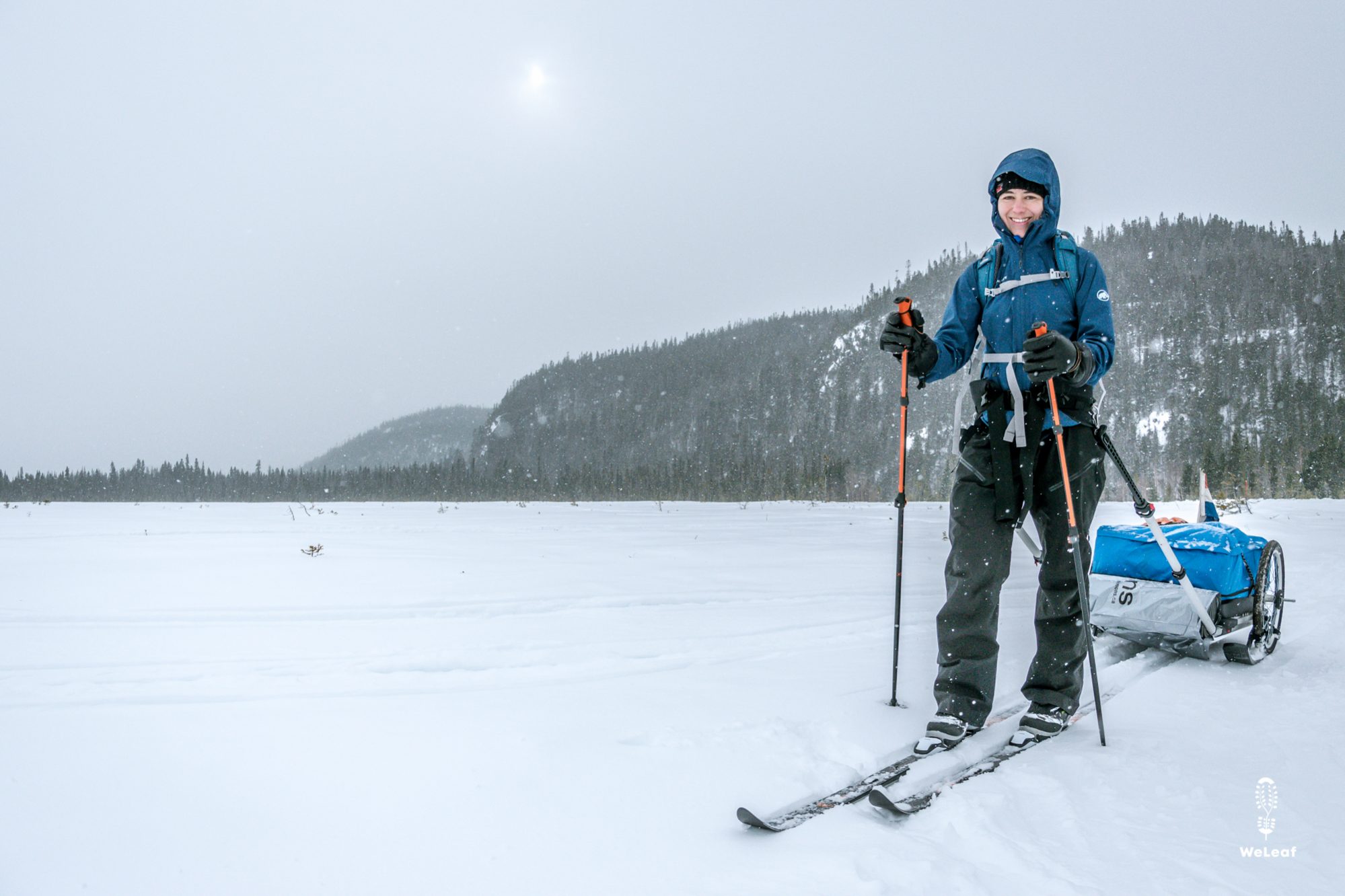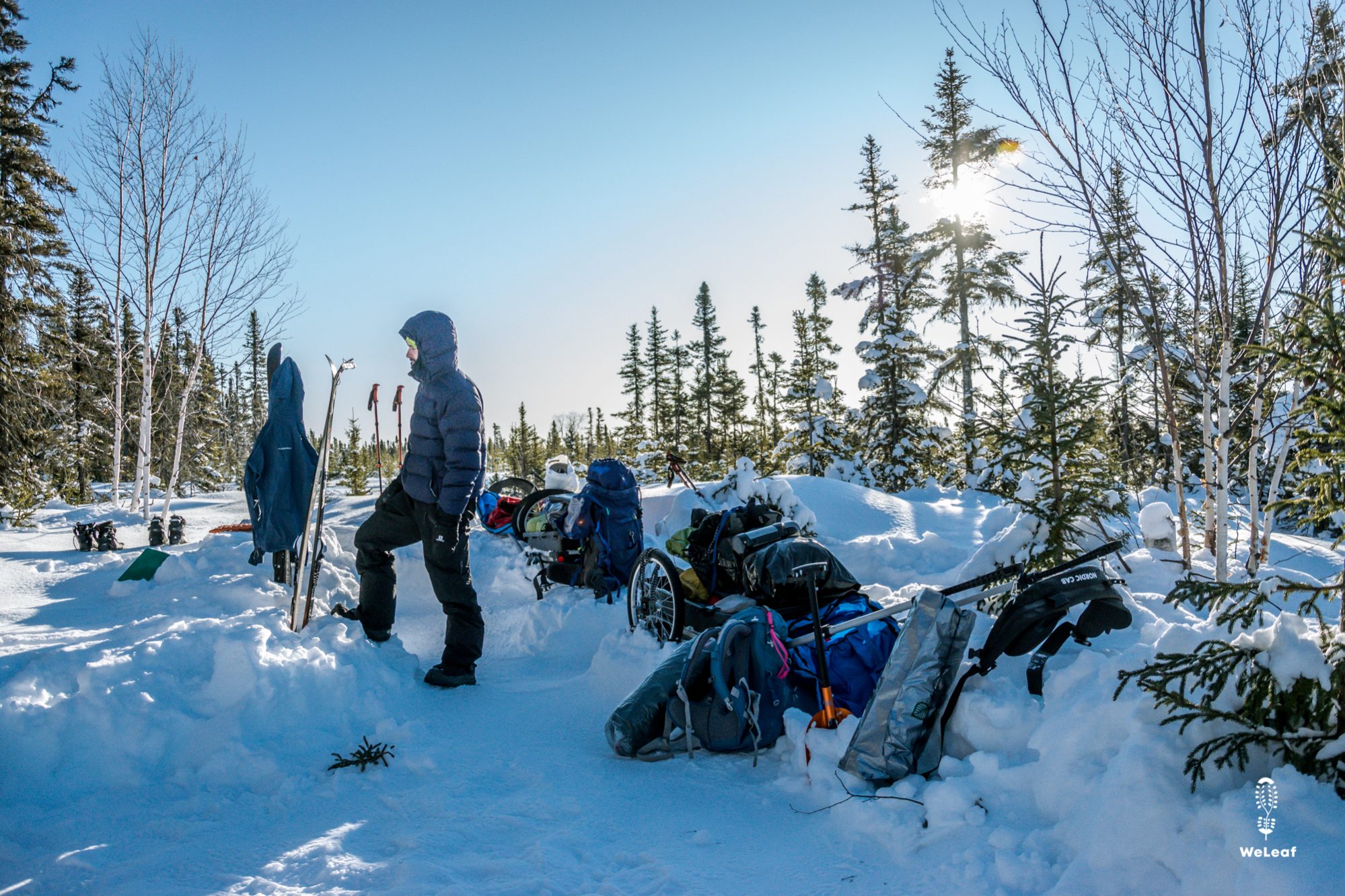
Winter routine

Odd man out
February 28, 2020
A hammock or a tent on a long trek?
March 17, 2020
Woensdag January 29th - In the tent
The eyes open, the morning light awakens us from our dreams and we look at the yellow color of the inner tent. The zippers are covered with a thick layer of frost, our nose is cold and we blow large white clouds of warm breath that immediately freezes in the air. The sleeping bag is covered with a white layer of ice around our mouth, but it is wonderfully warm inside the sleeping bag. The zippers are closed to the top and the neck collar is fully contracted. We still have our hats on. The most comfortable moment of winter camping is just over, twelve hours in a warm sleeping bag. Yesterday evening we quickly went to the toilet a second time, hoping to be able to sleep undisturbed all night. While Zoë slept like a marmot, Olivier woke up at five o'clock with great pressure on the bladder. Then you have the choice to be uncomfortably for two hours and lie awake, or suffer five minutes by crawling out of the sleeping bag and peeing in the freezing cold with only a thin layer of thermal underwear on. The pressure on the bladder won. -29 degrees was on the thermometer.
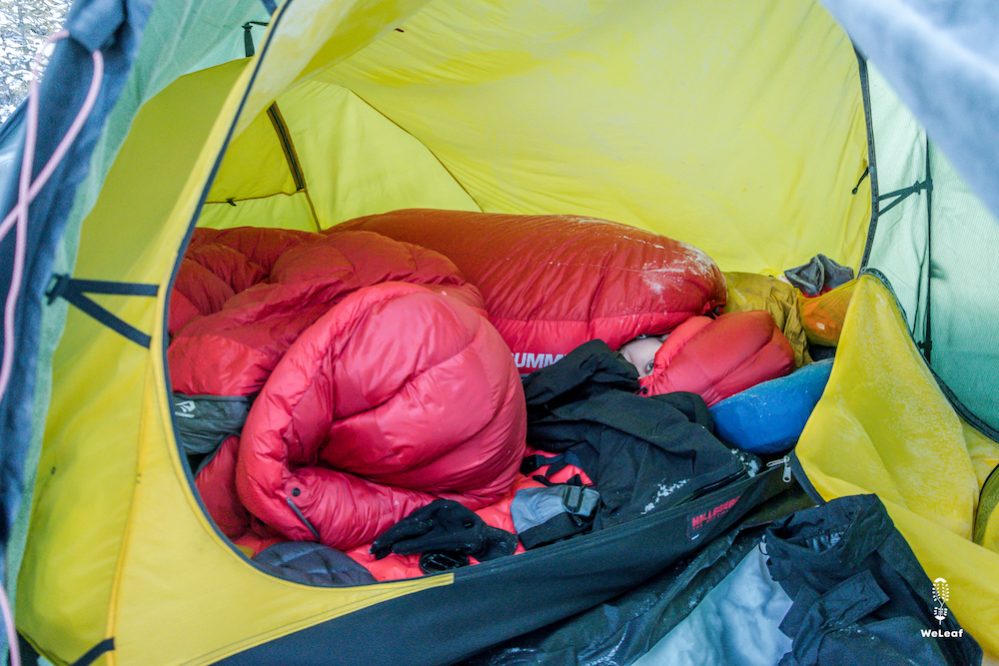
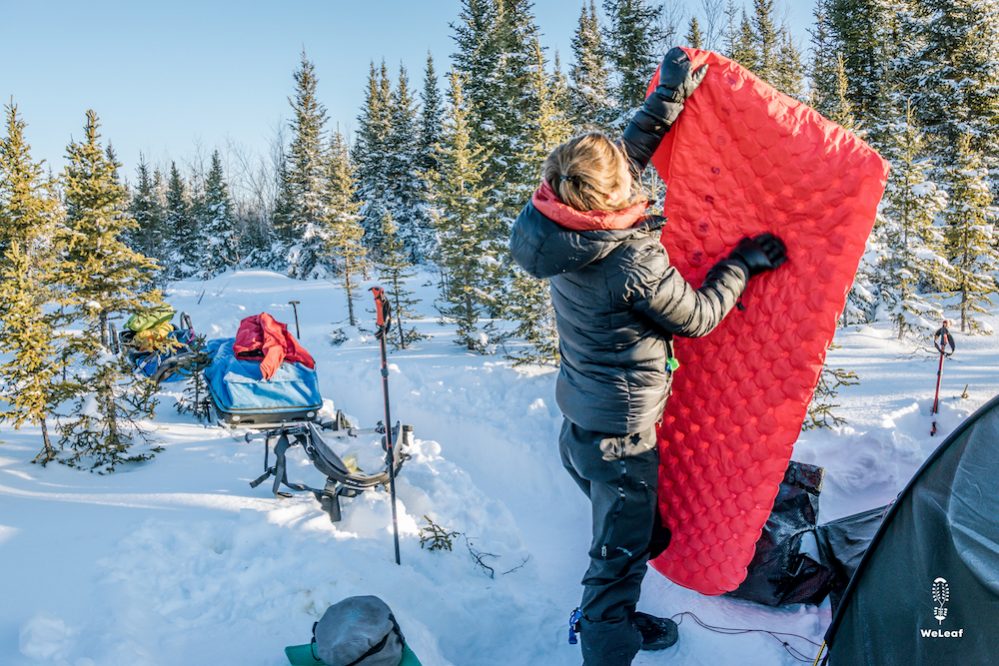
Our ski clothing is crammed at the foot of the sleeping bag. With our feet we try to distinguish a pair of socks from gloves, underpants, merino shirts and everything else. We try to put on as many clothes as possible in the warm sleeping bag, but to put on a shirt, the sleeping bag really has to be opened. With every inch we unzip the sleeping bag, more cold air flows in. As soon as we can, we put on our black shirt, but in all its intensity we touch the yellow inner tent and sweep a whole layer of ice around. We fully open the inner tent so that we have more space, but the entire zipper is frozen and produces half a snowstorm. We clearly need a little more routine because now we are constantly getting in each other's way and it takes far too long for us to be warmly wrapped. We snarl a bit at each other when we accidentally touch the tent and react the frustrations of the cold fingers to each other. Under normal circumstances we need an hour in the morning so we thought we would need an extra half an hour in the snow. Make that one hour more, minimum. Outside the tent we knock the snow off the sleeping bags and try to push the large volume of down back into the bag. That is not very easy with large gloves and is ice cold with bare hands. Because of the cold everything is stiff and less flexible and it is already cramming to stuff sleeping bags and air mattresses in bags that always seem too small. Zoe is clearly less bothered by cold fingers, while Olivier blows warm air non-stop on his fingers. "Time for a hand warmer," says Olivier. It is a small bag with a grainy content. Shake well and it heats up for 10 hours. After five minutes the bag starts to warm up, making the cold fingers a little more bearable.
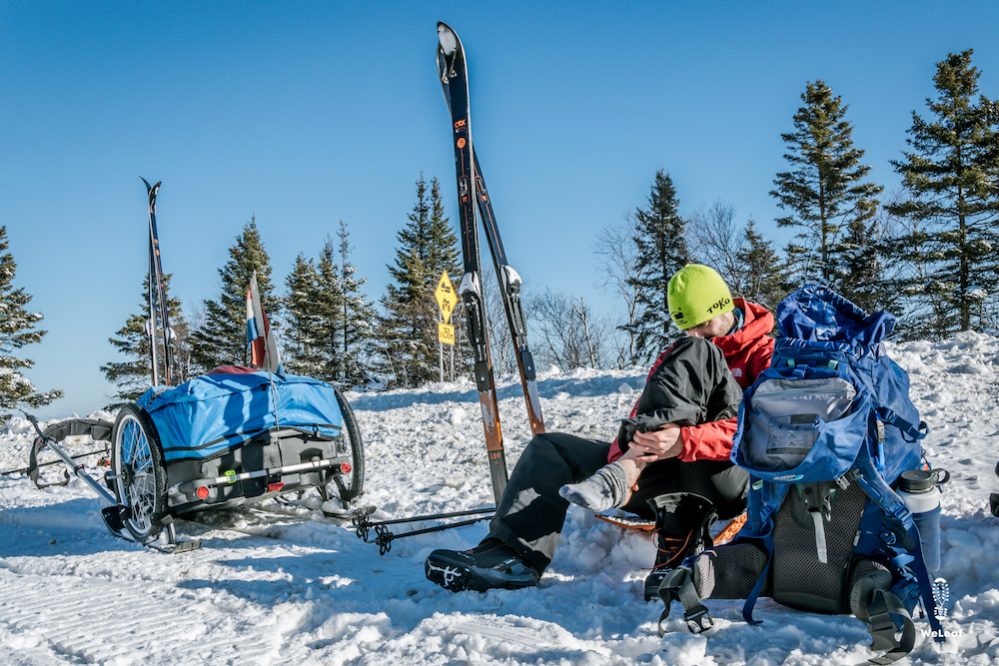
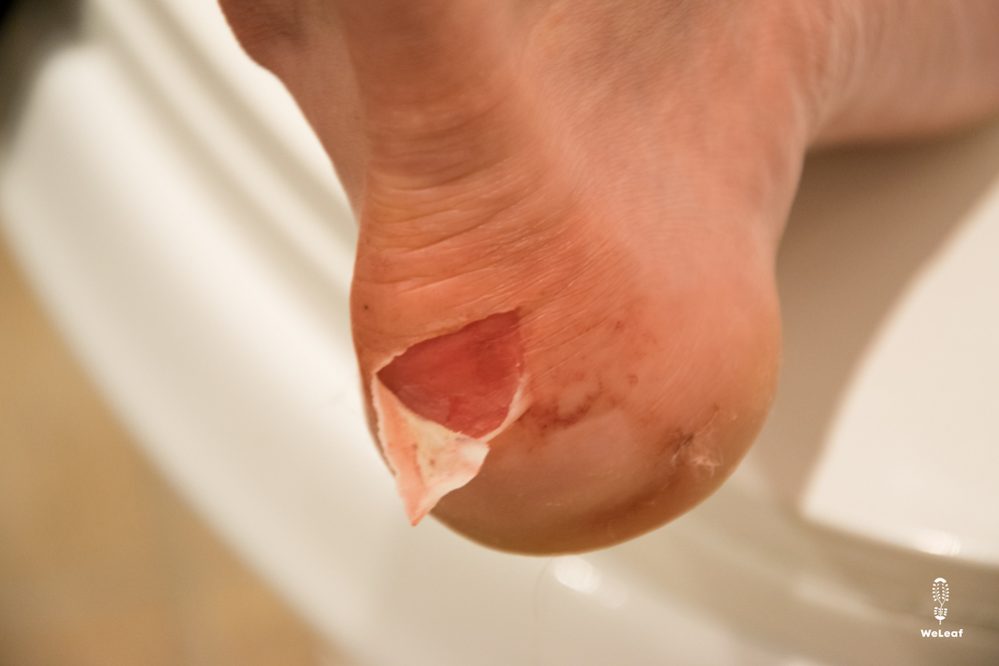
While Zoë continues to pack the sleeping gear and the tent, Olivier makes breakfast. We thought of heating the oatmeal in the morning with a jar of fondue gel. It doesn't give off much heat, but enough to heat some water, we thought. We mix a bit of water with milk powder and cocoa, pre-mixed in Quebec City. The mini flame from the jar of fondue gel is so weak that the layer of water is frozen after two minutes. Our thermo flask still contains yesterday's hot water that we use to defrost the water and add the oatmeal. The jar is warm for a while, but with -20 degrees everything cools down very quickly. We pimp the oatmeal with our granola-dried fruit-nut mix, but it is a cold breakfast and when we are halfway through the pan, the bottom part is frozen stiff. "We need a different solution for the morning," says Olivier, disappointed when he swallows a half-frozen spoon.
Olivier looks at his watch which already says that it's nine o'clock, we have been packing for more than two hours. We almost seem to be ready for departure, but every action that is normally so easy, gives a surprise again. We hardly get the toothpaste squeezed out of the tube, the hairs of the toothbrush are frozen and the sun cream has become a block of ice. Finally we change our shoes for the ski boots. Although it was -10 yesterday all day long, we did sweat a little in our shoes and on the inside we see a white layer of frost. The zipper of the boot is frozen and the shoe feels stiff. Olivier tries to squeeze his foot in, but the shoe seems three sizes too small. Olivier blows warm breath into the opening to thaw the shoe and press his feet in millimeter by millimeter. When we are finally in the boots, our toes are frozen. We try to warm up our feet with a fast fitness workout. The down jacket goes out and we replace it with our normal jacket, we start the GPS, click in our skis, tie the harness around our waist and slide the same hundred meters through the deep snow to the trail. Olivier sees that's it's nearly ten o'clock when he starts training on the GPS. "We certainly have a target time that we can improve tomorrow," he smiles at Zoë.
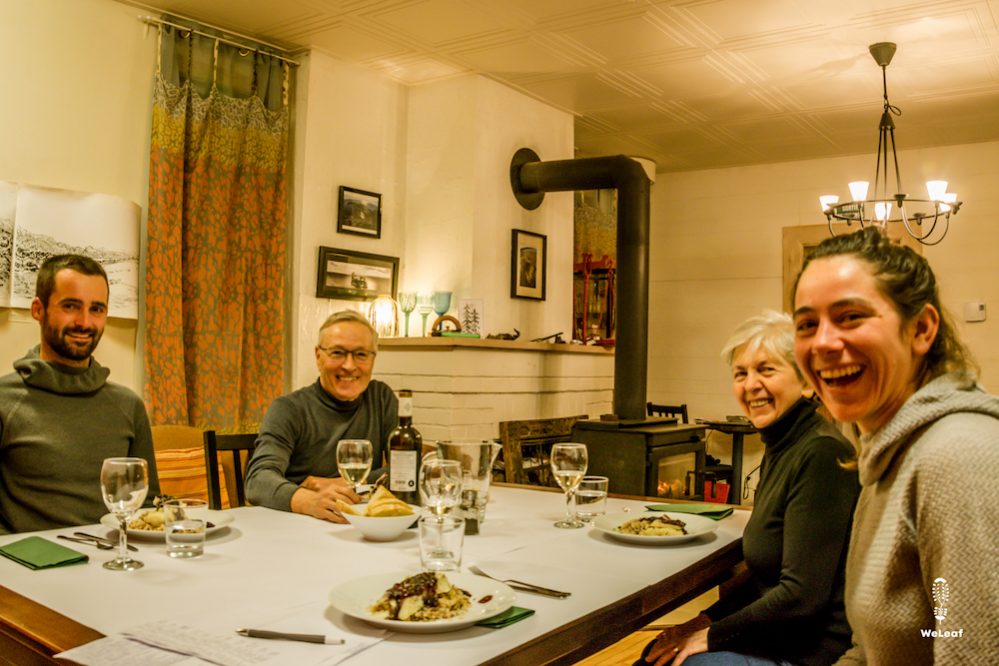
Franse eigenaars van de B&B
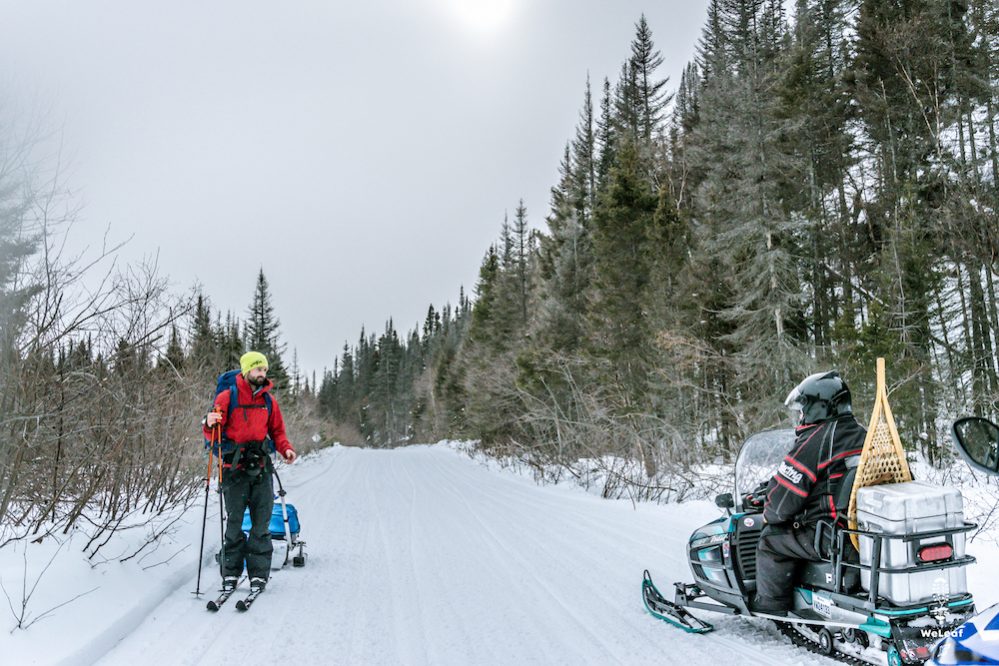
The second morning we are ready half an hour faster and have improved a lot of actions. A few more times in the snow and we have a routine, essential in these cold temperatures. On the trail it is still very quiet. Yesterday five snowmobiles passed us on a whole day, today we saw one. The snowmobile trail occasionally goes to the asphalt road when we have to cross a bridge. We can change the skis of the sled for a set of wheels. With this we can easily walk on the road and we are much more mobile when we enter a village for supplies. "I have to look at my feet," says Olivier. The shoes have now been thawed so that they go out easily. The heels of his feet turn red with a starting blister, but still in time for a second skin tape. Olivier uses the old ski boots from Carl, the biathlon coach from Fort Kent who unleashed this crazy ski idea. They have not been used much, but have not been adapted to Olivier's feet. "Well, suffering for three days and then we can ski for two months without problems," says Olivier optimistically. Our goal is to reach a small village of barely twenty houses. We can ask hot water there, which saves a lot of work and fuel. We enter a small shop, but she has no drinking water. She refers us to the inn further on and gives us the name of the woman. We knock on the door with the request for hot water and a place for the tent. They give us a warm bed, a shower and spoil us with fresh fish. Olivier's feet have gone from still-on-time, to not-that- good-looking. Open blisters on both feet that will not have much time to heal in the coming days. His optimistic three days may cause a lot more pain.
We start day four on skis with taped heels. For the first two hours, Olivier shuffles forward slowly, then the heels are paralysed and he can finally enjoy the beautiful trail. Just before we arrive in Port-Cartier, a snowmobile, or ski-doo, the brand name they use in Quebec, stops. An older man is sitting on a, in our eyes, antique snowmobile with a pale green color. He pushes his helmet up, turns off his machine and asks us "are you two going to Blanc-Sablon?" He was visiting the mini village where we stayed two days ago and heard about us. I want to meet those two, he decided. He can't believe his eyes if we quickly tell that we've been traveling for almost three and a half years. On the same day he comes by three more times, always with new questions, or to ask if we are really three years on the road. We have been traveling for less than a week, but our story is already ahead of us. Our fear that we would not be welcome has already turned into a welcome feeling. We get confirmation later in the day when two trail inspectors stop us. "This was it," we immediately think, but they are only interested in our adventure, telling us that we have to be careful with the speeding snow scooters and wish us a good trip. The snowmobiles that pass at the same time are checked on their trail pass, while we, two odd mans out, gradually become the story of the trail.
